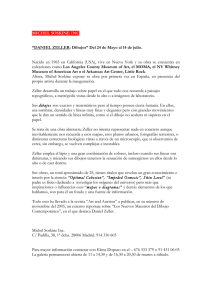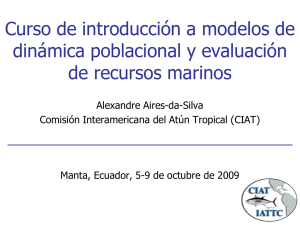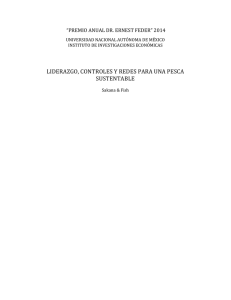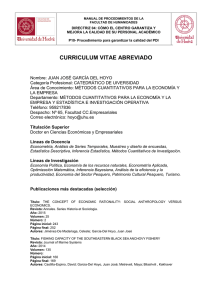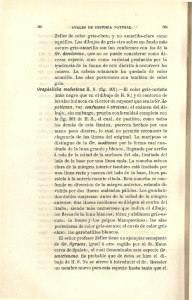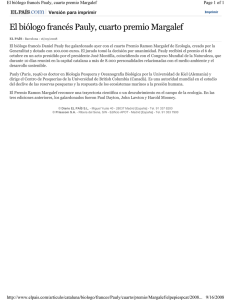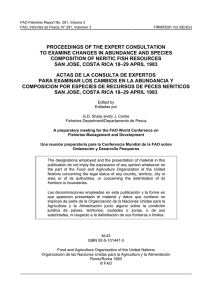GCFI Versus Global Fisheries
Anuncio
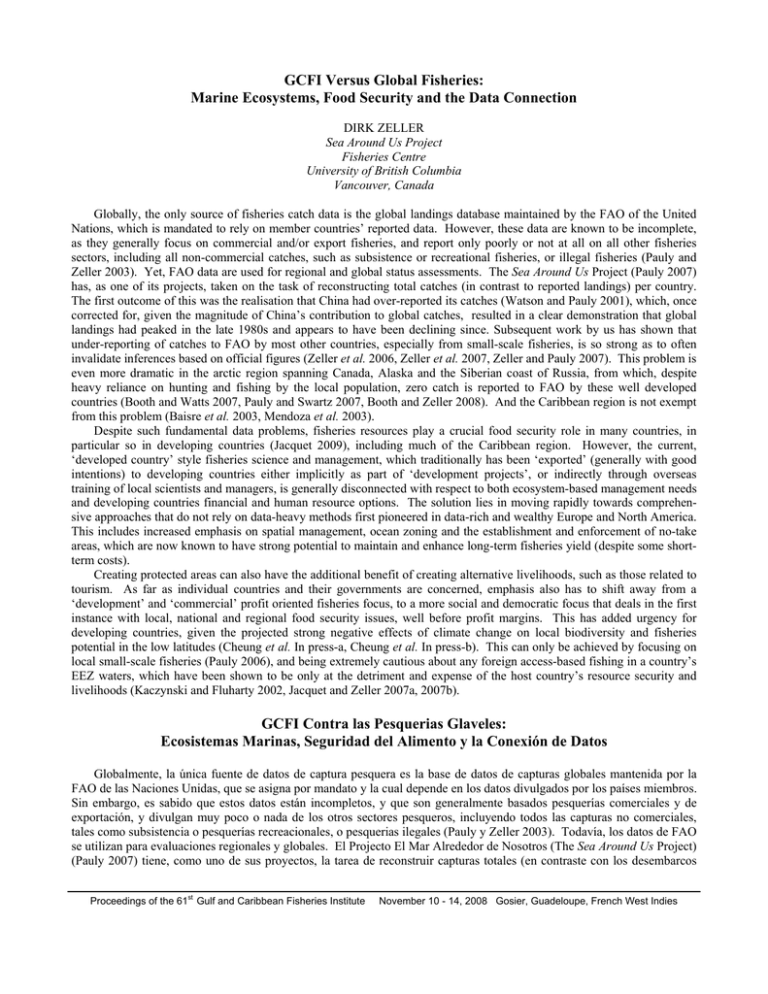
GCFI Versus Global Fisheries: Marine Ecosystems, Food Security and the Data Connection DIRK ZELLER Sea Around Us Project Fisheries Centre University of British Columbia Vancouver, Canada Globally, the only source of fisheries catch data is the global landings database maintained by the FAO of the United Nations, which is mandated to rely on member countries’ reported data. However, these data are known to be incomplete, as they generally focus on commercial and/or export fisheries, and report only poorly or not at all on all other fisheries sectors, including all non-commercial catches, such as subsistence or recreational fisheries, or illegal fisheries (Pauly and Zeller 2003). Yet, FAO data are used for regional and global status assessments. The Sea Around Us Project (Pauly 2007) has, as one of its projects, taken on the task of reconstructing total catches (in contrast to reported landings) per country. The first outcome of this was the realisation that China had over-reported its catches (Watson and Pauly 2001), which, once corrected for, given the magnitude of China’s contribution to global catches, resulted in a clear demonstration that global landings had peaked in the late 1980s and appears to have been declining since. Subsequent work by us has shown that under-reporting of catches to FAO by most other countries, especially from small-scale fisheries, is so strong as to often invalidate inferences based on official figures (Zeller et al. 2006, Zeller et al. 2007, Zeller and Pauly 2007). This problem is even more dramatic in the arctic region spanning Canada, Alaska and the Siberian coast of Russia, from which, despite heavy reliance on hunting and fishing by the local population, zero catch is reported to FAO by these well developed countries (Booth and Watts 2007, Pauly and Swartz 2007, Booth and Zeller 2008). And the Caribbean region is not exempt from this problem (Baisre et al. 2003, Mendoza et al. 2003). Despite such fundamental data problems, fisheries resources play a crucial food security role in many countries, in particular so in developing countries (Jacquet 2009), including much of the Caribbean region. However, the current, ‘developed country’ style fisheries science and management, which traditionally has been ‘exported’ (generally with good intentions) to developing countries either implicitly as part of ‘development projects’, or indirectly through overseas training of local scientists and managers, is generally disconnected with respect to both ecosystem-based management needs and developing countries financial and human resource options. The solution lies in moving rapidly towards comprehensive approaches that do not rely on data-heavy methods first pioneered in data-rich and wealthy Europe and North America. This includes increased emphasis on spatial management, ocean zoning and the establishment and enforcement of no-take areas, which are now known to have strong potential to maintain and enhance long-term fisheries yield (despite some shortterm costs). Creating protected areas can also have the additional benefit of creating alternative livelihoods, such as those related to tourism. As far as individual countries and their governments are concerned, emphasis also has to shift away from a ‘development’ and ‘commercial’ profit oriented fisheries focus, to a more social and democratic focus that deals in the first instance with local, national and regional food security issues, well before profit margins. This has added urgency for developing countries, given the projected strong negative effects of climate change on local biodiversity and fisheries potential in the low latitudes (Cheung et al. In press-a, Cheung et al. In press-b). This can only be achieved by focusing on local small-scale fisheries (Pauly 2006), and being extremely cautious about any foreign access-based fishing in a country’s EEZ waters, which have been shown to be only at the detriment and expense of the host country’s resource security and livelihoods (Kaczynski and Fluharty 2002, Jacquet and Zeller 2007a, 2007b). GCFI Contra las Pesquerias Glaveles: Ecosistemas Marinas, Seguridad del Alimento y la Conexión de Datos Globalmente, la única fuente de datos de captura pesquera es la base de datos de capturas globales mantenida por la FAO de las Naciones Unidas, que se asigna por mandato y la cual depende en los datos divulgados por los países miembros. Sin embargo, es sabido que estos datos están incompletos, y que son generalmente basados pesquerías comerciales y de exportación, y divulgan muy poco o nada de los otros sectores pesqueros, incluyendo todos las capturas no comerciales, tales como subsistencia o pesquerías recreacionales, o pesquerias ilegales (Pauly y Zeller 2003). Todavía, los datos de FAO se utilizan para evaluaciones regionales y globales. El Projecto El Mar Alrededor de Nosotros (The Sea Around Us Project) (Pauly 2007) tiene, como uno de sus proyectos, la tarea de reconstruir capturas totales (en contraste con los desembarcos Proceedings of the 61st Gulf and Caribbean Fisheries Institute November 10 - 14, 2008 Gosier, Guadeloupe, French West Indies Page 2 61st Gulf and Caribbean Fisheries Institute divulgados) por país. El primer resultado de esto era la realización que China había sobre- reportado sus capturas (Watson y Pauly 2001), para los cuales, corregido una vez, dada la magnitud de la contribución de China a los capturas globales, dio lugar a una demostración clara que los desembarcos globales habían enarbolado al final de los '80 y aparece haber declinado desde entonces. El trabajo subsecuente de nosotros ha demostrado que la mayoría de los otros países también reportaban capturas menores a la FAO, especialmente de pesquerías de pequeña escala, esta tendencia están fuerte que a menudo invalide las inferencias basadas en las figuras oficiales (Zeller et al. 2006, Zeller et al. 2007, Zeller y Pauly 2007). Este problema es aún más dramático en la región ártica que atraviesa Canadá, Alaska y la costa siberiana de Rusia, de la cual, a pesar de la alta dependencia en la caza y la pesca por parte de la población local, cero capturas son reportadas a la FAO por estos países bien desarrollados (Booth and Watts 2007, Pauly y Swartz 2007,Booth y Zeller 2008). Y la región del Caribe no es exenta de este problema (Baisre et al. 2003, Mendoza et al 2003). A pesar de tales problemas fundamentales de los datos, los recursos pesqueros desempeñan un papel crucial de la seguridad del alimento en muchos países, particularmente en los países en vías de desarrollo (Jacquet 2009), incluyendo la mayoría de la región del Caribe. Sin embargo, la corriente, ‘País en desarrollo’ estilo de ciencia pesquera y de manejo, que ha sido tradicionalmente `exportado' (generalmente con buenas intenciones) a los países en vías de desarrollo o implícito como parte `de los proyectos de desarrollo', o indirectamente atreves de la capacitación en el exterior de científicos y de administradores esta generalmente desconectada con respecto a necesidades de manejo basadas en el manejo del ecosistema y en las opciones de desarrollo financiero y el recurso humano. La solución está en un movimiento rápido hacia acercamientos comprensivos hacia métodos que no dependen en una gran cantidad de datos. Estos métodos fueron iniciados en Europa y Norteamérica países ricos en ricos en datos. Esto incluye énfasis creciente en el manejo espacial, la zonificación del océano y el establecimiento y la regulación de áreas sin captura, que ahora se sabe que tienen un gran potencial para mantener y realzar la producción pesquera a largo plazo (a pesar de algunos costos a corto plazo). Crear áreas protegidas puede también tener la ventaja adicional de crear sustentos alternativos, tales como ésos relacionados con el turismo. Los países y sus gobiernos centro de preocupación y su énfasis también tiene que cambiar del modelo de ‘desarrollo’ y ‘comercio’ de pesquerías a un modelo con un enfoque más democrático y social que trate en primer lugar con la seguridad local, nacionales y regionales del alimento, mucho antes de los márgenes de la ganancias. Esto ha agregado la urgencia para los países en vías de desarrollo, dado a los fuertes efectos negativos proyectados debido al cambio climático en biodiversidad local y del potencial pesquero en las bajas latitudes (Cheung et al. En prensa-a; Cheung et al. En prensa-b). Esto se puede alcanzar solamente centrándose en pesquerías locales de pequeña escala (Pauly, 2006), y siendo extremadamente cauteloso sobre cualquier acceso de pesca extranjero en las aguas de EEZ de un país, que se han demostrado para estar solamente en el detrimento y el costo de la seguridad y de los sustentos del recurso del país de anfitrión (Kaczynski y Fluharty 2002, Jacquet y Zeller 2007a, 2007b). LITERATURE CITED Baisre, J.A., S. Booth, and D. Zeller. 2003. Cuban fisheries catches within FAO area 31 (Western Central Atlantic): 1950 – 1999. Pages 133-139 in: D. Zeller, S. Booth, E. Mohammed, and D. Pauly (Eds.) From Mexico to Brazil: Central Atlantic Fisheries Catch Trends and Ecosystem Models. Fisheries Centre Research Report 11(6), Vancouver, Canada. Booth, S. and D. Zeller. 2008. Marine fisheries catches in arctic Alaska. Fisheries Centre Research Reports 16(9), Fisheries Centre, University of British Columbia, Vancouver, Canada. 59 pp. Booth, S. and P. Watts. 2007. Canada's arctic marine fish catches. Pages 3-16 in: D. Zeller, and D. Pauly (Eds.) Reconstruction of Marine Fisheries Catches for Key Countries and Regions (1950-2005). Fisheries Centre Research Reports 15(2). University of British Columbia Fisheries Centre, Vancouver, Canada. Cheung, W.L., V. Lam, J. Sarmiento, K. Kearney, R. Watson, D. Zeller, and D. Pauly, D. [In press-a]. Large-scale redistribution of maximum fisheries catch potential in the global ocean under climate change. Global Change Biology. Cheung, W.W.L., V. Lam, J. Sarmiento, K. Kearney, R. Watson, D. and Pauly. [In press-b]. Projecting global marine biodiversity impacts under climate change scenarios. Fish and Fisheries. Jacquet, J. 2009. Fish as food in an age of globalization. Ph.D. University of British Columbia, Vancouver, Canada. 185 pp. Jacquet, J.L. and D. Zeller. 2007a. National conflict and fisheries: reconstructing marine fisheries catches for Mozambique. Pages 35-47 in: D. Zeller and D. Pauly (Eds.) Reconstruction of Marine Fisheries Catches for Key Countries and Regions (1950-2005). Fisheries Centre Research Reports 15(2). University of British Columbia Fisheries Centre, Vancouver, Canada. Jacquet, J.L. and D. Zeller. 2007b. Putting the 'United' in the United Republic of Tanzania: Reconstructing marine fisheries catches. Pages 49-60 in: D. Zeller and D. Pauly (Eds.) Reconstruction of Marine Fisheries Catches for Key Countries and Regions (1950-2005). Fisheries Centre Research Reports 15(2). University of British Columbia Fisheries Centre, Vancouver, Canada. Kaczynski, V.M. and D.L. Fluharty. 2002. European policies in West Africa: who benefits from fisheries agreements? Marine Policy 26:75-93. Mendoza, J., S. Booth, and D. Zeller. 2003. Venezuelan marine fisheries catches in space and time: 1950-1999. Pages 171-180 in: D. Zeller, S. Booth, E. Mohammed,. and D. Pauly (Eds.) From Mexico to Brazil: Central Atlantic fisheries Catch Trends and Ecosystem Models. Fisheries Centre Research Reports 11(6), Vancouver, Canada. Pauly, D. and D. Zeller. 2003. The Global Fisheries Crisis as a Rationale for Improving the FAO’s Database of Fisheries Statistics. Pages 1-9 in: D. Zeller, S. Booth, E. Mohammed,. and D. Pauly (Eds.) From Mexico to Brazil: Central Atlantic fisheries Catch Trends and Ecosystem Models. Fisheries Centre Research Reports 11(6), Vancouver, Canada. Pauly, D. 2006. Major trends in small-scale marine fisheries, with emphasis on developing countries, and some implications for the social sciences. Maritime Studies (MAST) 4:7-22. Zeller, D. GCFI:61 (2009) Page 3 Pauly, D. 2007. The Sea Around Us Project: Documenting and communicating global fisheries impacts on marine ecosystems. Ambio 36:290-295. Pauly, D. and W. Swartz. 2007. Marine fish catches in North Siberia (Russia, FAO Area 18). Pages 17-33 in: D. Zeller and D. Pauly (Eds.) Reconstruction of Marine Fisheries Catches for Key Countries and Regions (1950-2005). Fisheries Centre Research Reports 15(2). University of British Columbia Fisheries Centre, Vancouver, Canada. Watson, R. and D. Pauly. 2001. Systematic distortions in world fisheries catch trends. Nature 414:534-536. Zeller, D., S. Booth, P. Craig, and D. Pauly. 2006. Reconstruction of coral reef fisheries catches in American Samoa, 1950-2002. Coral Reefs 25:144-152. Zeller, D. and D. Pauly. (Eds.). 2007. Reconstruction of Marine Fisheries Catches for Key Countries and Regions (1950-2005). Fisheries Centre Research Reports 15(2), University of British Columbia Fisheries Centre, Vancouver, Canada. 163 pp. Zeller, D., S. Booth, G. Davis, and D. Pauly. 2007. Re-estimation of small-scale fisheries catches for U.S. flag island areas in the Western Pacific: The last 50 years. Fisheries Bulletin 105:266-277.
